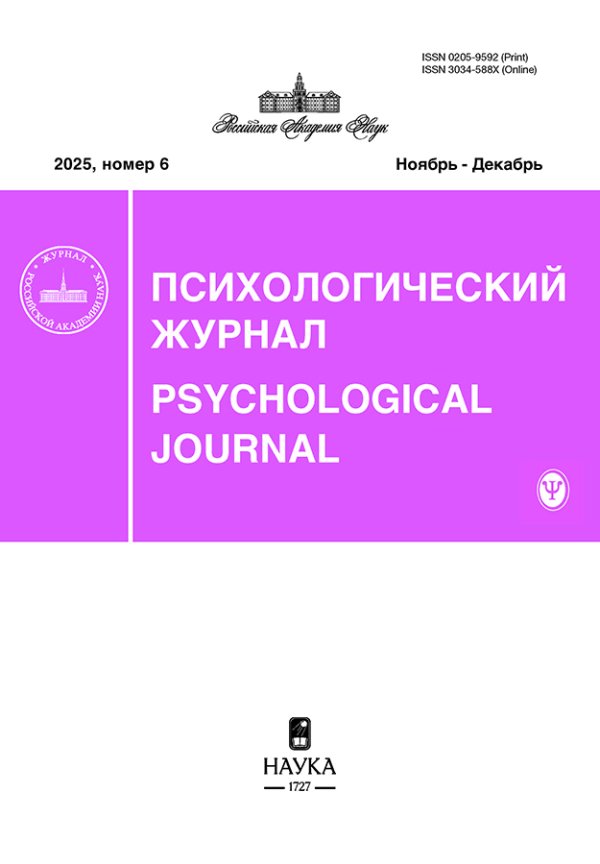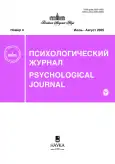Scientific problematization of psychological assistance to combat veterans
- Authors: Gornostaev S.V.1, Zhuravlev A.L.2
-
Affiliations:
- Academy of the Federal Penitentiary Service of Russia
- Institute of Psychology, Russian Academy of Sciences
- Issue: Vol 46, No 4 (2025)
- Pages: 14-24
- Section: Theoretical and metodological problems in psychology
- URL: https://bakhtiniada.ru/0205-9592/article/view/309366
- DOI: https://doi.org/10.31857/S0205959225040026
- ID: 309366
Cite item
Abstract
The problem of psychological assistance to veterans has becomes relevant due to the scale and intensity of a special military operation. A lot of experience has been accumulated in providing psychological aid to veterans, but this work cannot yet be called scientifically based. However, in the process of gaining experience, which is a necessary stage for identifying and understanding existing problems in this area, scientific problematization of this activity is already possible. It is obvious that a number of applied approaches and practices require scientific expertise, reflection and revision. The knowledge accumulated in this field needs to be analyzed, systematized and purposefully extended. Scientific problematization of the practice of professional psychological assistance to combat veterans will help to mobilize the scientific community and coordinate the efforts of researchers in creating a reliable and relevant scientific base for the effectiveness of this work. The article outlines the main problems, gaps and difficulties existing in the available knowledge about the negative psychological consequences for veterans, as well as about providing them with psychological assistance. The main problems are: 1) classification of the negative psychological consequences of being in the combat zone; 2) differentiation of approaches to working with combatants experiencing various adverse consequences of hostilities; 3) optimization of the intervention of psychological health specialists in the process of natural rehabilitation and readaptation of veterans; 4) difficulties in involving veterans in the psychotherapeutic process; 5) prevention of readaptive psychotraumatization a veteran after returning to civil society; 6) the difficulties of constructive resocialization of mentally safe veterans. The knowledge gained as a result of solving these problems can be summarized in a section of psychological science that could be called “postwar psychology”.
About the authors
S. V. Gornostaev
Academy of the Federal Penitentiary Service of Russia
Author for correspondence.
Email: stanislavrz@yandex.ru
390000, Ryazan, Sennaya str. 1, Russia.
A. L. Zhuravlev
Institute of Psychology, Russian Academy of Sciences
Email: alzhuravlev2018@yandex.ru
129366, Moscow, Yaroslavskaya str., 13 bldn. 1, Russia.
References
- Gnezdilov G.V., Kiselev V.V., Gnezdilova M.G. Osobennosti psihoreabilitacionnoj raboty s uchastnikami boevyh dejstvij s posttravmaticheskim stressovym rasstrojstvom (PTSR). Chelovecheskij kapital. 2023. № 11–2 (179). P. 78–89. (In Russian)
- Karajani A.G. Psihologicheskaja pomoshh’ uchastnikam boevyh dejstvij (po zarubezhnym vzgljadam). Aktual’nye problemy klinicheskoj psihologii i praktika ih reshenija. Mat-ly Vseross. nauch.-prakt. konf. Moscow, 2023. P. 44–49. (In Russian)
- Karajani A.G. Psihologicheskie posledstvija uchastija v boevyh dejstvijah: “ne PTSRom edinym”. Rossijskij voenno-psihologicheskij zhurnal. 2023. № 2(2). P. 75–83. (In Russian)
- Karajani A.G., Karajani Ju.M. Psihologicheskie posledstvija vojny i social’no-psihologicheskaja readaptacija uchastnikov boevyh dejstvij. Psihologija. Psihofiziolo- gija. 2014. № 4. P. 59–66. (In Russian)
- Kolov S.A., Chehlatyj E.I., Shamrej V.K. Vlijanie osobennostej otdel’nyh kognitivnyh processov na klinicheskuju kartinu i jeffekty lechenija postboevyh stressovyh rasst-rojstv // Vestnik psihoterapii. 2012. № 42 (47). P. 101–109. (In Russian)
- Mal’ceva V.I. Psihologicheskie bar’ery veteranov s PTSR pri poiske pomoshhi: sovremennyj vzgljad na problemu i overkaming. Aktual’nye problemy sovremennoj Rossii: psihologija, pedagogika, jekonomika, upravlenie i pravo. Sb. nauch. tr. II Ezhegodnoj mezhdunar. nauch.-prakt. konf. i Mezhdunar. nauch.-prakt. konf. Moscow, 2024. P. 1292–1298. (In Russian)
- Petrova V.N., Achkasov E.E., Puzin S.N. et al. Aktual’nye voprosy psihologicheskoj reabilitacii veteranov boevyh dejstvij na sovremennom jetape. Vestnik Vserossijskogo obshhestva specialistov po mediko-social’noj jekspertize, reabilitacii i reabilitacionnoj industrii. 2021. № 3. P. 16–22. (In Russian)
- Psihologicheskaja reabilitacija uchastnikov boevyh dejstvij: uchebnoe posobie. Pod obshh. red. A.G. Karajani, M.S. Poljanskogo. Moscow: Voennyj universitet, 2003. (In Russian)
- Hodos L.A., Efimov V.N. Fenomen psihologicheskoj zashhity i koping-strategij uchastnikov boevyh dejstvij. International Journal of Medicine and Psychology. 2024. V. 7. № 2. P. 193–201. (In Russian)
- Bourne P.G. Military psychiatry and the Vietnam experience. The American Journal of Psychiatry. 1970. № 127. P. 481–488.
- Davison E.H., Kaiser A.P., Spiro A. et al. From Late-Onset Stress Symptomatology to Later-Adulthood Trauma Reengagement in Aging Combat Veterans: Taking a Broader View. Gerontologist. 2016. № 56 (1). Р.14–21. doi: 10.1093/geront/gnv097.
- Friedman M.J. Post-Vietnam syndrome: recognition and management. Psychosomatics. 1981. № 22 (11). P. 931–943. doi: 10.1016/S0033-3182(81)73455-8.
- Glass A.J. Psychotherapy in the combat zone. The Ame-rican Journal of Psychiatry. 1954. № 110. P. 725–731.
- Hoge C.W., Castro C.A., Messer S.C. et al. Combat duty in Iraq and Afghanistan, mental health problems, and barriers to care. The New England Journal of Medicine. 2004. № 351 (1). Р. 13–22. doi: 10.1056/NEJMoa040603.
- Magruder K.M., Forsberg C.W., Friedman M.J. et al. Prevalence of Posttraumatic Stress Disorder in Aging Vietnam-era Veterans: VA Cooperative Study № 569, The Course and Consequences of Posttraumatic Stress Disorder in Vietnam-era Veteran Twins. American Journal of Geriatric Psychiatry. 2016. № 24 (3). P. 181–191. doi: 10.1016/j.jagp.2015.05.004.
- Marini C.M., Fiori K.L., Wilmoth J.M. et al. Psychological Adjustment of Aging Vietnam Veterans: The Role of Social Network Ties in Reengaging with Wartime Memories. Gerontology. 2020. № 66 (2). Р. 138–148. doi: 10.1159/000502340.
- Marmar C.R., Schlenger W., Henn-Haase C. et al. Course of Posttraumatic Stress Disorder 40 Years After the Vietnam War: Findings From the National Vietnam Veterans Longitudinal Study. JAMA Psychiatry. 2015. № 72 (9). P. 875–881. doi: 10.1001/jamapsychiatry.2015.0803.
- Matthews M.D. Head Strong: How Psychology Is Revolutionizing War. New York, USA: Oxford University Press, 2014.
- McCranie E.W., Hyer L.A. Posttraumatic stress disorder symptoms in Korean conflict and World War II combat veterans seeking outpatient treatment // Journal of Traumatic Stress. 2000. № 13 (3). P. 427–439. doi: 10.1023/A:1007729123443.
- Motta R.W. Psychotherapy for Vietnam-related Posttraumatic Stress Disorder // Psychological Reports. 1993. № 73(1). Р. 67–77. doi: 10.2466/pr0.1993.73.1.67.
- Palmer B.W., Friend S., Huege S. et al. Aging and Trauma: Post Traumatic Stress Disorder Among Korean War Veterans // Federal Practioner. 2019. № 36 (12). P. 554–562.
- Strange R.E., Brown D.E. Home from the war: a study of psychiatric problems in Viet Nam returnees // The American Journal of Psychiatry. 1970. № 127 (4). P. 488–492. doi: 10.1176/ajp.127.4.488.
- Zohar J., Cohen H., Cwikel-Hamzany Sh. New insights into secondary prevention in post-traumatic stress disorder // Dialogues in Clinical Neuroscience. 2011. № 13. Р. 301–309.
Supplementary files










